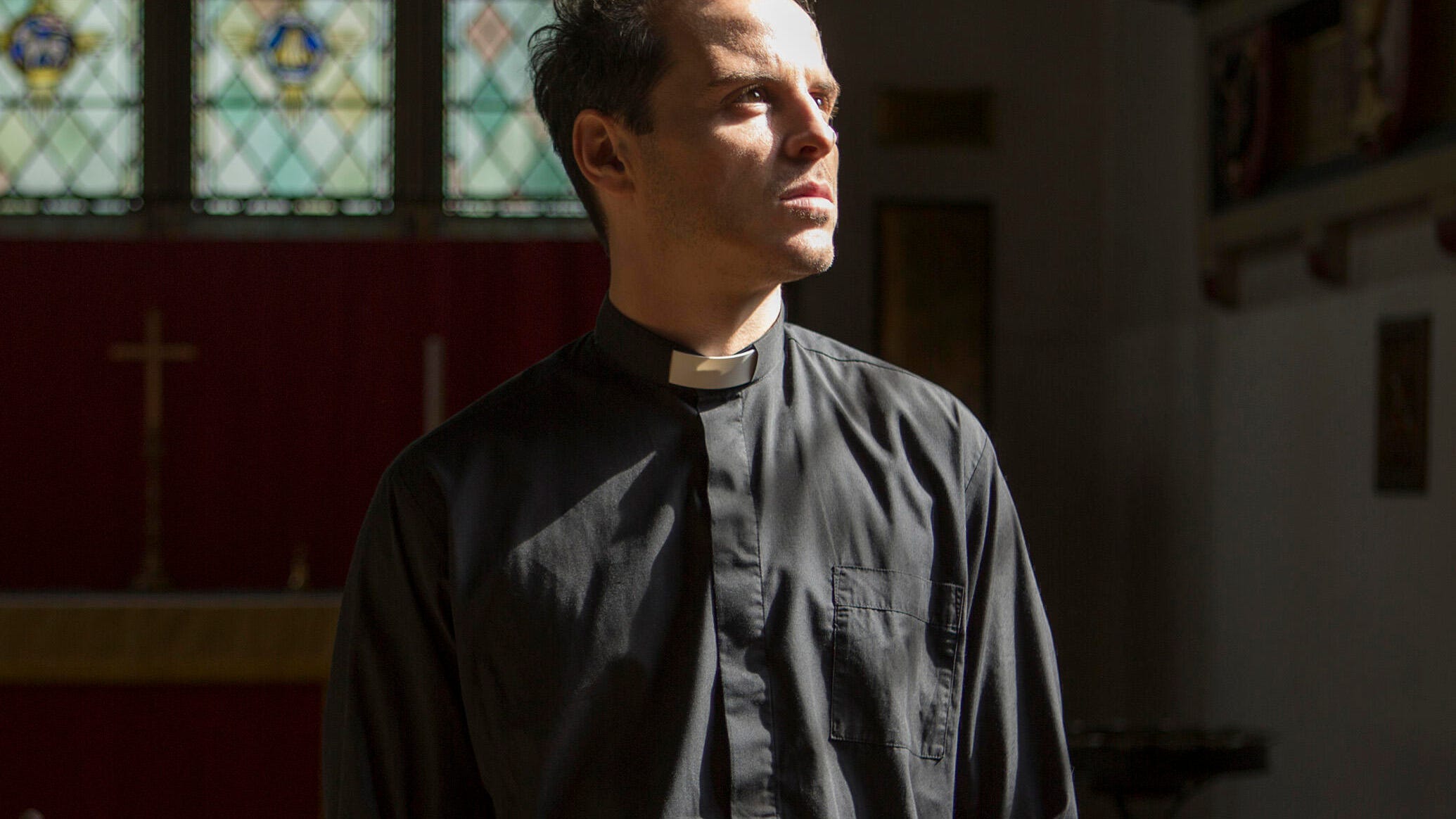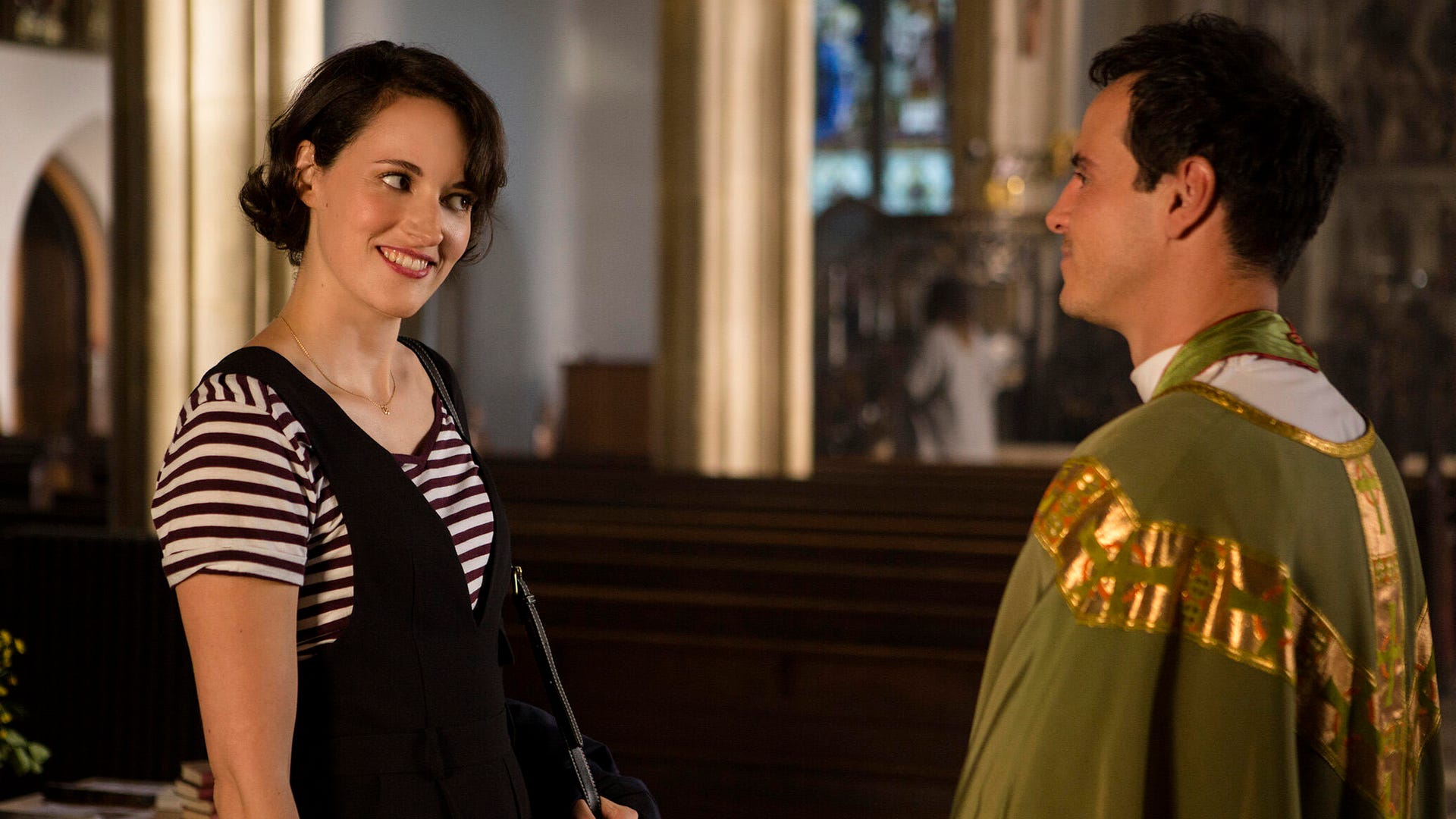
Fleabag's Hot Priest Makes Us See Men of Faith as Complex and Conflicted
Moving beyond the Ned Flanders caricature

This story is part of a series, "I See You Man," about depictions of manhood and masculinity running through the month of November, which is Men's Health Awareness month.
Early last month, at a meeting of bishops called to address the shortage of priests on the Amazon, Pope Francis made headlines when he announced that he would consider allowing married elders in the area to be officially ordained-- that, in other words, the Catholic church might change its policy on staunch celibacy.
It was hard not to read that announcement as simply the latest testament to the influence of Phoebe Waller-Bridge. The actor, playwright, and showrunner's enormously acclaimed series Fleabag, produced for the BBC in the U.K. and airing on Amazon Prime Video in North America, was received rapturously by critics, won the Emmy Awards for Outstanding Comedy Series and Outstanding Comedy Actress, and became a staple of dinner party conversation in seemingly every city in the world. Among its many accomplishments is the creation of a character that has already become prestige-TV canon: the Hot Priest, who, in light of what transpires over the course of Fleabag's second season, could have used some of that latitude on procreative policy from the Catholic church.
The Hot Priest -- credited simply as the Priest (Andrew Scott) on the show but known to all across the internet with that adjective appended -- is an Irish-Catholic man of the cloth who is in almost all ways, from the moment we meet him, unlike any other priest found elsewhere in the movies or on television. Introduced in the first episode of the show's second season, the Priest serves as both the hero's major love interest and the moral conundrum at the heart of the show -- the man she feels compelled to tempt away from his vows but whose life she knows deep-down she really shouldn't ruin. As the season continues, the will-they-won't-they tension mounts, and they flirt with not just the possibility of love and happiness but the very real prospect of disaster.
I See You Man: TV Guide's Exploration Into How TV Depicts Manhood Now
Of course, Fleabag herself being a morally dubious (if utterly charming) character from the start of the series onward, it makes sense that she should be conflicted by the promise of an unattainable love, a test of principles we hope she'll pass on the road to self-improvement. The Priest himself, on the other hand, is another matter. Scott, famed for his role as nefarious Benedict Cumberbatch foil Moriarity on BBC's Arthur Conan Doyle adaptation Sherlock, plays the Priest as complex, curious, even provocative; he isn't the quintessential pious man beleaguered by some seductive temptress, but rather a complicated man with wants and desires who happens to have sworn an oath to God. The oath makes his vocation. The desires make him human.
When we first meet him, at a fraught family dinner at a fancy restaurant, the Priest hardly seems like one at all. He drinks like a fish; he curses, openly and extravagantly, and he even cracks a joke about his brother being a convicted pedophile. Naturally, he intrigues Fleabag, and we can see her wanting to pursue him sexually from a mile away. What's surprising is how the Priest receives her advances: not as a shocking transgression that he would never have considered without her making a move, but as a normal exchange of desires between two adults, one of whom merely can't act on the (otherwise perfectly understandable) feelings.

Phoebe Waller-Bridge and Andrew Scott, Fleabag
Amazon Prime VideoIt's a respectful portrayal of a character type that's rarely treated seriously in popular culture. Men of religion are often characterized as either insanely straight-laced goodie-goodies of the Ned Flanders variety or, maybe even more outrageously, as corrupt hypocrites donning the collar to hide a dark past, such as Caleb onBuffy the Vampire Slayer (Nathan Fillion) or Jesse Custer (Dominic Cooper) on Preacher. Andrew Scott's Hot Priest is that rare breed: an essentially good, well-meaning man who takes his religion and his vocation seriously, but who might stray from the path from time to time under the pressure of a real moral crisis. It makes the audience sympathetic and more broadly understanding -- we see where he's coming from and what he values, as well as the harder choices he might have to make.
You hardly have to be a priest to relate. It makes you realize that sincerely religious men are almost never shown on television other than in overly religious programming, and that faith, not exactly the sexiest of subjects to be sure, has rarely figured so intimately into a character's complex makeup. Part of what makes the Priest so fascinating, besides his effect on Fleabag, is that Phoebe Waller-Bridge allows the Priest's values as a man of religion to be taken seriously. His dilemma -- love or God -- isn't reduced to a cliche, where his celibacy is just a hurdle that we root for the character to get over. That makes for much more interesting drama, in television terms. And it makes for a much richer and more complex man on screen.
Fleabag is streaming on Amazon Prime Video.